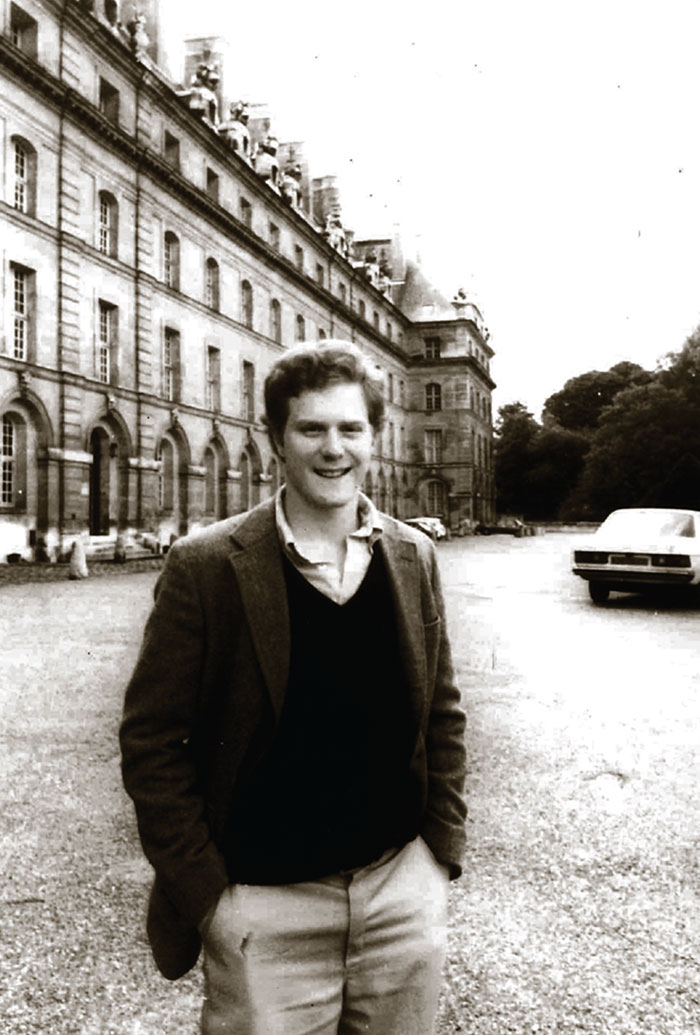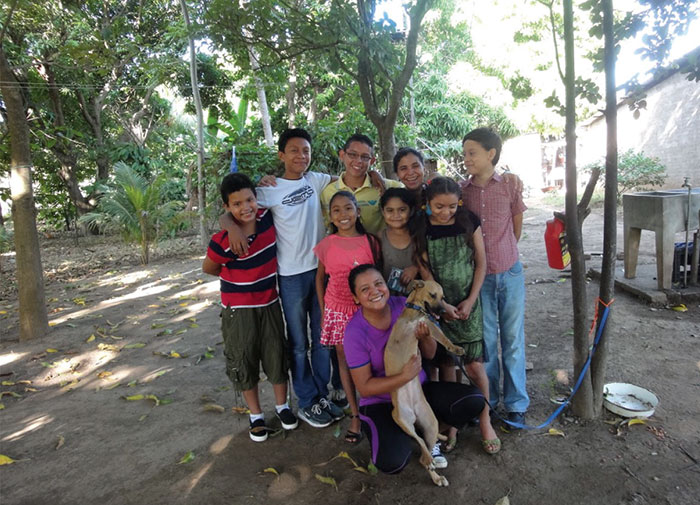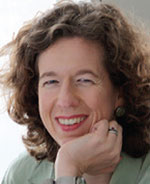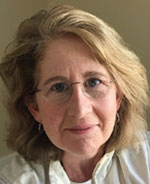Two Decades of Volunteer Support: Kirby Simon’s Legacy
The J. Kirby Simon Foreign Service Trust is uniquely committed to expanding the opportunities for community service to people associated with U.S. embassies and consulates.
BY KATHLEEN SHEEHAN AND LIISA ECOLA

Kirby Simon in Paris in 1981.
Photo Courtesy of John and Claire Simon
How far can $4,395 go toward helping others? At an orphanage in Haiti, it saved lives.
Over the past two decades, the J. Kirby Simon Foreign Service Trust has given out small but valuable grants for projects all over the world. The Haitian grant, made in 2009, helped enclose and waterproof two rooms of an orphanage, and build a third. The two existing rooms had been open to the elements, and heavy rains made them useless as classrooms. When Hurricane Sandy struck Haiti in 2012, the children in the orphanage weathered the storm in a literal sense, taking shelter in the newly constructed rooms. They all survived in the midst of terrible destruction.
The application was submitted by an Embassy Port-au-Prince team of nine people, led by a husband and wife, Cecilia and Jerome Oetgen, who volunteered at the orphanage, teaching the children and sponsoring Christmas parties. Even though the Oetgens were no longer at post by this point, their impact lived on.
Stories like this—not all so dramatic, but all meaningful—are why the J. Kirby Simon Trust persists in its mission: issuing grants to members of the extended Foreign Service community so they can give back to the places where they serve. Nobody else does what we do.
What Is the J. Kirby Simon Trust?
The J. Kirby Simon Foreign Service Trust was started by John and Claire Simon in 1996 as a memorial to their son (see insert below). Kirby Simon, a first-tour FSO, died of accidental carbon monoxide poisoning while serving at the American Institute in Taiwan in 1995. He was only 33. Anyone who knew him remembers that he had a quick wit, was wise beyond his years and had an immense interest in the demands and challenges of being an FSO.
Each year, the trust puts out a call for applications from members of the Foreign Service community who are volunteering overseas and who could use a small grant to bolster their efforts. Ten trustees meet annually to review the grant applications. Almost all of us knew Kirby Simon personally; some of us worked with him overseas, while others knew him through John and Claire. We all have some personal appreciation for what it is to serve as a diplomat overseas. Serving on the board of trustees is truly a labor of love; we have no full-time staff and rely entirely on donations.
Each year, the trust puts out a call for applications from members of the Foreign Service community who are volunteering overseas and who could use a small grant to bolster their efforts.
Dan Morris, a trustee, explains our commitment this way: “A bit of idealism, a service orientation, and a desire to make a difference in people’s lives are big motivations for most of us joining the Foreign Service. Often that attitude is hard to maintain as one faces the magnitude and reality of the problems we’re presented and the difficulty of addressing them. Kirby embodied the best of that idealism and joy of life in serving others, and it is fitting that the trust in his name has been able to do so much for so many.”
In any given year, we receive from 35 to 100 applications, and fund between one-half to two-thirds of them. We look for people who are committed to their projects through volunteering on their own time, not simply raising funds. We focus on projects that would be difficult to fund any other way—too large for the applicant to pay for themselves, but too small for most established charities.
ON THE INSPIRATION FOR THE TRUST
Kirby started the thinking that ultimately led to the creation of the J. Kirby Simon Foreign Service Trust. During his last holiday at home in late 1994, Kirby, who had taught English as a second language in Spain after graduating from college, told us about the pro bono English-language class he was offering employees of the American Institute in Taiwan.
One day he casually mentioned that the students might find a tape recorder helpful. At the next session, each of his six students brought one. Kirby had been surprised and delighted by the response, because, as he explained, tape recorders made language teaching both easier and more effective.
He pointed out, however, that Taiwan was a developed country. In other parts of the world even simple gadgets, no matter how worthwhile, would be out of reach. Although we didn’t know it at the time, that conversation was the spark for the idea that small donations could make a difference.
We had hoped that a memorial to Kirby would have an international dimension. He loved foreign languages and travel, and almost any engagement with the wider world. But without the resources of a large foundation, what could we do?
A dear friend, Herbert Hansell (who would serve on the board until his death in May 2015), offered to help us explore the problem. Herb, who had served as legal adviser to the State Department, was then a senior partner in the Washington, D.C., law firm of Jones Day, which has a distinguished international practice. Herb and his wife Jeanne invited us to dinner with some of their close friends—all retired ambassadors and their spouses—to discuss the great need for help in so many areas abroad, and the endless pitfalls for the inexperienced and ignorant in the effort to give such help.
The takeaway from their very candid views was clear: corruption in many of the neediest countries was hard for “do-gooders” to avoid. The pitfalls and possibilities for missteps were as likely as a pessimistic imagination would suggest.
But Herb’s guests also spoke with admiration of the volunteer activities performed by many at post. Those people spoke the language of the country and knew the turf. Obviously, they didn’t give their time to causes unless they believed in them. They might not be able to cure river blindness or malaria, but they could improve the local school, clinic, women’s shelter, orphanage or playground.
That became our answer, as well. Help to the helpers!
—John and Claire Simon
What Has It Done?
Since making our first grants in 1997, we have disbursed $1.4 million to 666 projects in countries around the world. Successful applicants usually request small amounts, typically under $4,500. Some grants are for as little as $500.
During those 19 years, the trust has funded a wide variety of projects. In just one year, we provided computers for a soup kitchen in Argentina, greenhouses for a war-torn village in Bosnia, wells for a village hit hard by a cyclone in Myanmar (Burma), personal hygiene supplies for a homeless shelter in China and lighting for a youth basketball program in Cote d’Ivoire. And that’s just A through C.

The J. Kirby Simon Fund awarded $820 for the project English for Children and Young At-Risk People in Rivas, Nicaragua. Funds were used to purchase English teaching materials. Shown here are students with an injured dog adopted by the class. Students in the program learn English and serve their community.
Mercedes Palacios
The authors of this piece have reviewed many hundreds of applications. Some are from groups of embassy or consulate staff members who want to conduct a medical outreach event, build a house or install new equipment at an orphanage where they volunteer. Other individuals use their unique talents to make a difference coaching a sports team or giving music lessons, or fill a specific need such as providing coats to the elderly. We have conferred awards on ambassadors and entry-level officers, specialists and nurses, employees and spouses, American and local employees.
These grants have helped both our applicants and, more importantly, the groups with which they work. One of our 2015 grants funded an embassy group in Abuja, composed of both Americans and Nigerians, that provides English lessons to children and adults who have left their homes due to persecution and poverty, as well as to those who have fled Boko Haram’s destruction. Their lack of English relegates them to very menial jobs, if any, so the grant funds simple items: tables to sit at and books about topics relevant to the students’ lives.
FSO Althea Cawley-Murphee sums up her experience with the trust like this: “Teaching English classes was one of the most important parts of my experience in Abuja. Serving at a high-threat post can be difficult, and our time away from the office can be rather monotonous. Getting off compound and working with people far outside the social classes I typically interacted with at work made a huge difference in giving my experience in Abuja a strong sense of purpose.”
Dana Cunliffe, an assistant community liaison officer, explains how volunteering with the same group affected her: “English teaching has allowed me to interact with and learn from Nigerians who have experienced great suffering. This experience has expanded my view of the world, and I am not the same person I was before I began teaching.”
We made another grant in 2015 to Quito Cares, a highly regarded community action group that was founded in 2008 by several Foreign Service spouses. At the group’s request, the trust provided $4,200 to the Fundación Jonathan, which provides medical support and food for low-income people. The grant allowed the local organization to purchase an industrial oven to bake bread on a daily basis for people in need of sustenance. As grant writer Erzsebet Best-Pitlu explains, “The J. Kirby Simon Foreign Service Trust helped me continue sharing our values in the world that is contributing to the human spirit; and it made possible not only doing my part, but doing my best.”
Why Does It Matter?
This trust is unique: It is the only organization of its kind committed to expanding the opportunities for professional fulfillment and community service to people associated with U.S. embassies and consulates. We support individuals and groups who are already willing to use part of their own time and energy to extend their reach. We help foster cooperation among post staff to increase the numbers of people who volunteer, whether they are members of the Foreign Service, other American and local staff, or family members. In many cases, these grants have facilitated long-term relationships between embassies and consulates and local charitable organizations—relationships that might otherwise end when the lead volunteer leaves post.
Since making our first grants in 1997, we have disbursed $1.4 million to 666 projects in countries around the world.
As trustees, we are reminded over and over of the hardships so many endure around the globe. Many of the applications are heartbreaking, addressing the combined effects of grinding poverty with attitudes that disadvantage the most vulnerable people—the disabled, unwed mothers, children and refugees. One poignant phrase came from an applicant several years ago in describing the project she hoped to fund: “I assure you, the need is real.”
The reminder that such small amounts of funding can make such big differences is like an annual injection against cynicism. None of us can fully solve these problems, but each of us can do something, however small.
What Can We Do?
As the trust looks forward, we are making changes that we hope will continue our work into the next generation. We now have a Facebook page and are updating our website, www.kirbysimontrust.org.
Given that we can accomplish so much with so little, donations of any size are graciously welcomed. We are always happy to answer questions about the work of the trust via emails sent to kirbysimontrust@gmail.com.
Applications for our 20th grant cycle are due on April 1. Guidelines for applicants are available at www.kirbysimontrust.org.
We are honored to be part of an organization that has created something meaningful from an untimely death. As trustee Colette Marcellin puts it, “The Simons found the wisdom and strength to respond to their tragedy with this beautiful gift of a trust. This gift—both their legacy and Kirby’s legacy—continues to help so many people throughout the world.”
Read More...
- J. Kirby Simon Foreign Service Trust
- Remembering Kirby Simon (Department of State Archive)
- AFSA Memorial Plaque






